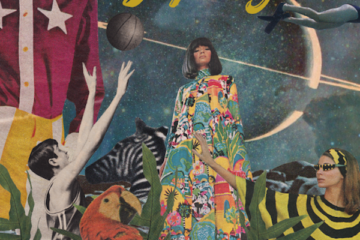Baroque Pop
Commenting on Canada’s largest city, the writer Margaret Atwood once made the joke “First prize a week in Toronto, second prize two weeks in Toronto”. Times change and a now thoroughly cosmopolitan Toronto is the city that’s produced the captivating tunes of baroque electronic ensemble Austra.
Austra’s critically acclaimed 2011 album Feel It Break showcased the unique vocal style of Katie Stelmanis, a classically-trained musician originally part of pre-Austra outfit Galaxy (alongside fellow Austra member Maya Postepski). There was much noise made at the time regarding the sexual politics of Austra given that Stelmanis and many of the band members were gay. It’s an issue that’s largely become irrelevant in Austra’s developing career as Stelmanis has previously stated that she considers herself as a musician first. Although she considers her sexuality to be a factor in music writing, it’s clear that Austra is not an outfit that feels the need to take on a political stance.
Now Austra’s second album Olympia arrives after a lengthy period of touring and promoting Feel It Break
. Olympia’s evolution took place during a year of writing and recording in a period in which Austra’s line-up expanded from its core unit of Stelmanis, Postepski and bassist Dorian Wolf to a full 6-piece band.
Curiously, Austra’s record label Domino have gone to great pains to state that although Olympia is “filled with electronic and synthetic sounds”, the album is also “free of programming and loops” while also confirming that the album was recorded live. It reads almost like an apology for a band having the audacity to use electronic instruments to begin with – a criticism that could be read in many thinly veiled comments from a portion of the writers covering Austra’s rapid career rise (including a reviewer who once dismissed Austra’s use of “dated synths”).
For Stelmanis, there’s no controversy and the evocative moods and drama of Feel It Break emerged from embracing electronic music rather than dismissing it. That said, Olympia
certainly appears to be a much more organic collection of songs and, witnessing the chemistry of the band on stage, it’s perhaps understandable that there’s an urge to see if that live dynamic can be caught on record. If there’s a downside to this it’s that the album does appear at times to lack the idiosyncratic style of its predecessor.
At the core of the album is Katie Stelmanis’ distinctive voice which soars and swoops through the tracks on Olympia always commanding attention. The often ambiguous nature of the lyrics challenges the listener to use their imagination to fill in the gaps, but there’s always an emotional weight behind much of the percussive rhythms and melodic tones of the material to suggest themes of joy, loss, regret and reflection.
Opener ‘What We Done?’ builds on a fragmented intro with elements of sub-bass and melodic flute-like tones heraldling the arrival of Stelmanis announcing “Come back to me, you’re seventeen”. It builds into a crescendo of driving electropop and emerges as a highlight of the album.
‘Forgive Me’ builds on the regimented bass of Dorian Wolf for a track that makes use of open spaces and subtle electronic effects. The subtle dance beats of ‘Painful Like’ paint a reflective soundscape augmented by brief dub effects as Katie’s swooping voice soars above it. There’s a generous use of harmonics on Olympia (usually courtesy of Austra regulars Sari & Romy Lightman) which is evident on tracks such as ‘Fire’ with its rustic tones, wood percussion and subtle washes of white noise.
‘Home’, which was also released as a single ahead of the album, is a superb heart breaking song with its simple piano stabs and subtle electronic rhythms providing the ideal foundations for Stelmanis’ trilling vocal dramatics. ‘I Don’t Care (I’m a Man)’ is perhaps one of Austra’s most non-ambiguous songs with its commentary on domestic violence. The lilting Caribbean beats and rhythms on ‘We Become’, meanwhile, expands Austra’s musical palette.
There’s an appealing charm to the arpeggio-led ‘Reconcile’ which also makes fine use of echo on the vocals, augmented once again with the Lightman sisters, to give a haunting delivery. The club-orientated rhythms of ‘Annie (Oh muse, you)’ wears its dance beat influences on its sleeve. Meanwhile, ‘You Changed My Life’ offers up another icy intimate moment with its isolated vocal/minimalist piano before giving Maya Postepski an opportunity to shine with its percussion-driven second half.
‘Hurt Me Now’ manages to combine sparse percussive effects with broody synths and samples to craft a dramatic tune of yearning and melancholia. It’s a fine song to close proceedings with.
Olympia continues to carry the torch for Austra’s particular flavour of electronic music, although it never quite seems to scale the heights that Feel It Break
achieved. It still boasts the brooding drama and compelling electronic moods that Austra have made their own, but there’s a danger perhaps that in future the band may feel obliged to strip away those very elements that make Austra sound so special.
Olympia is available via Amazon.
Text by Paul Browne
18th June 2013











